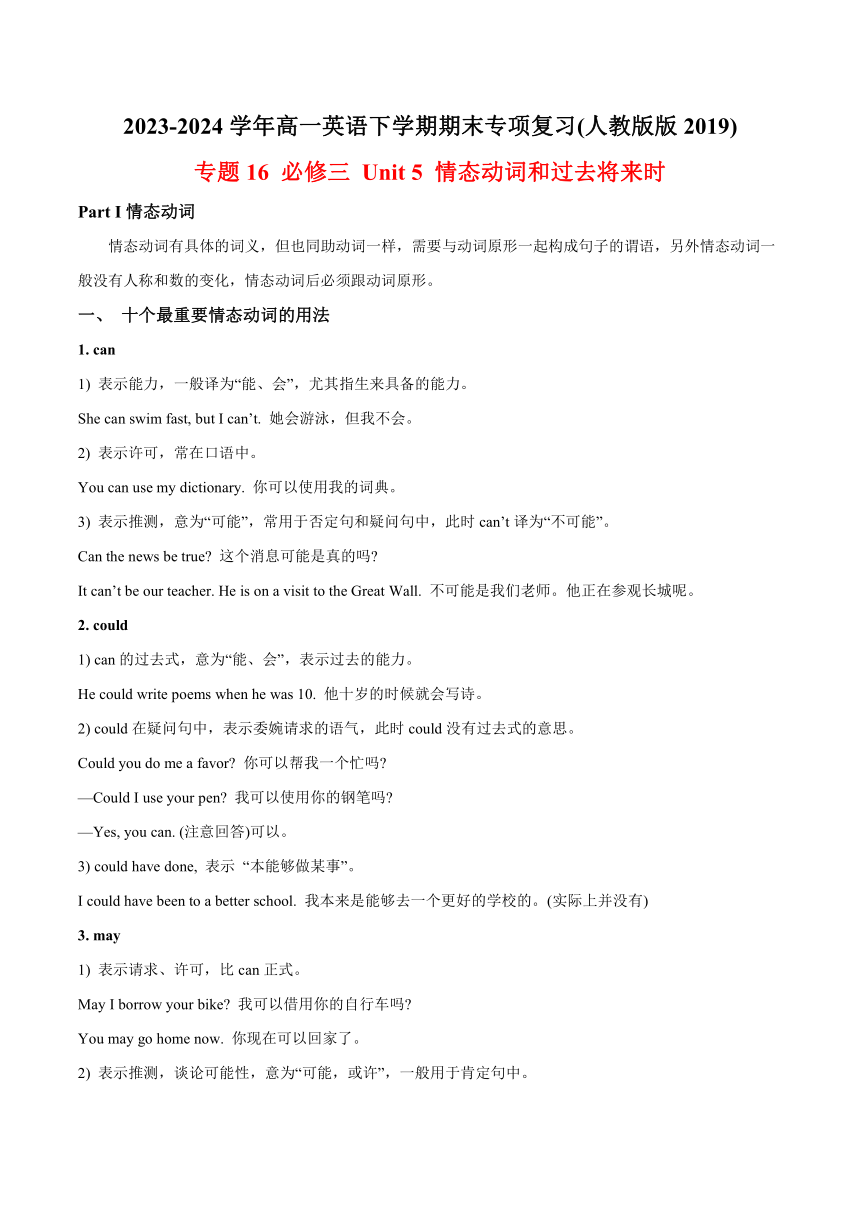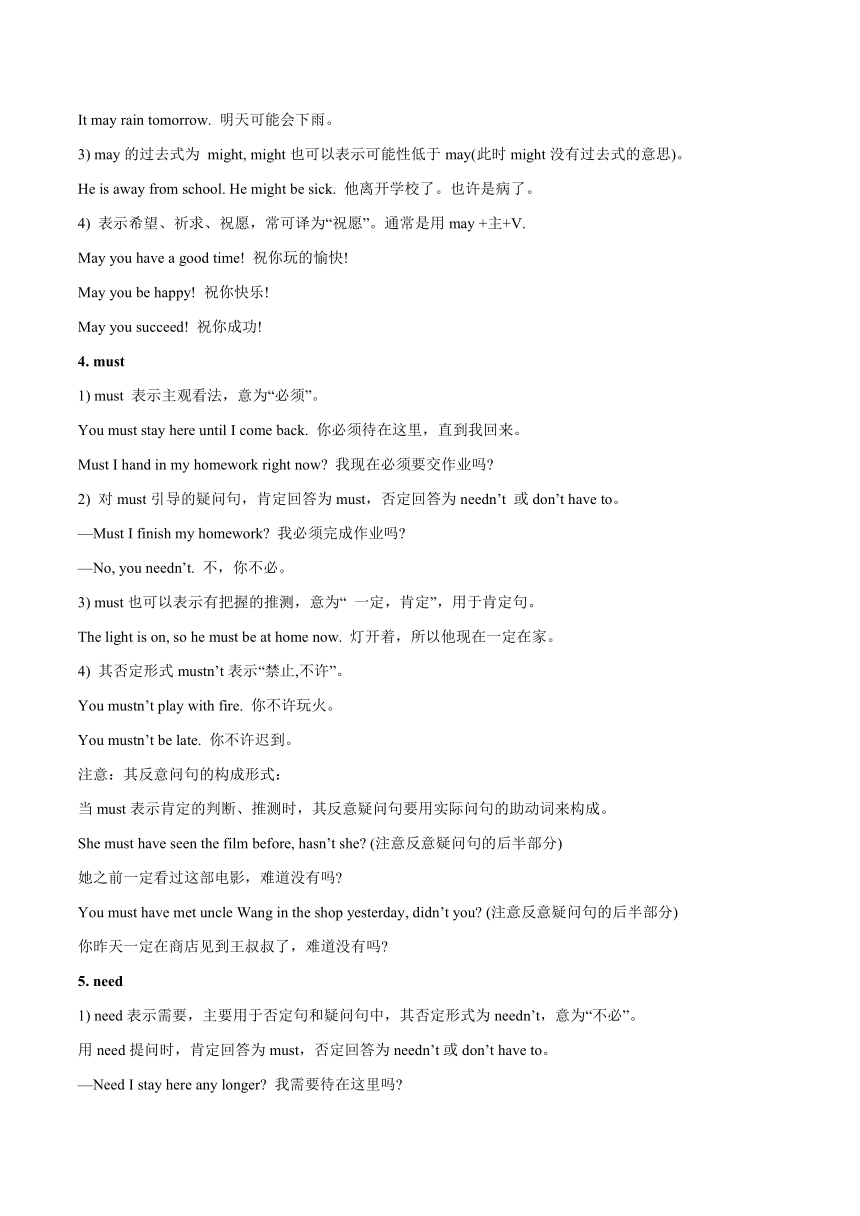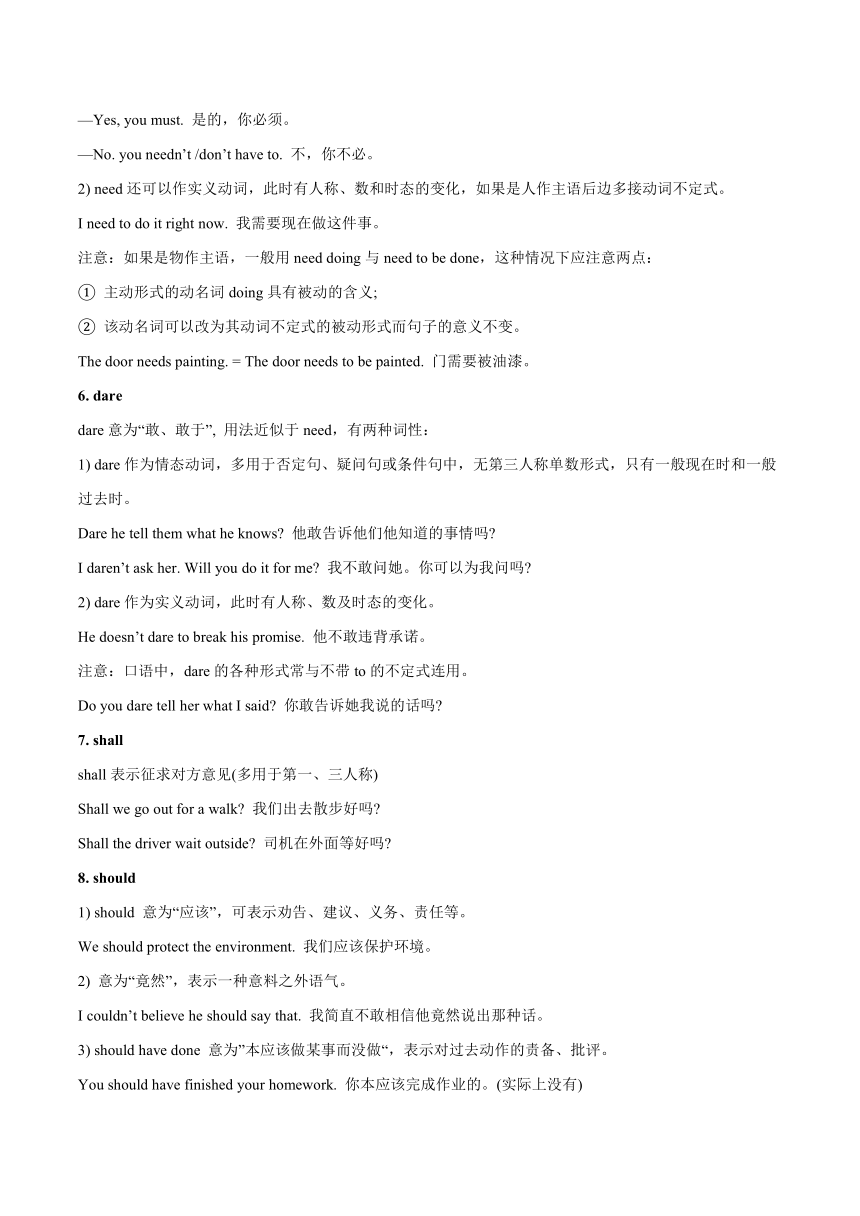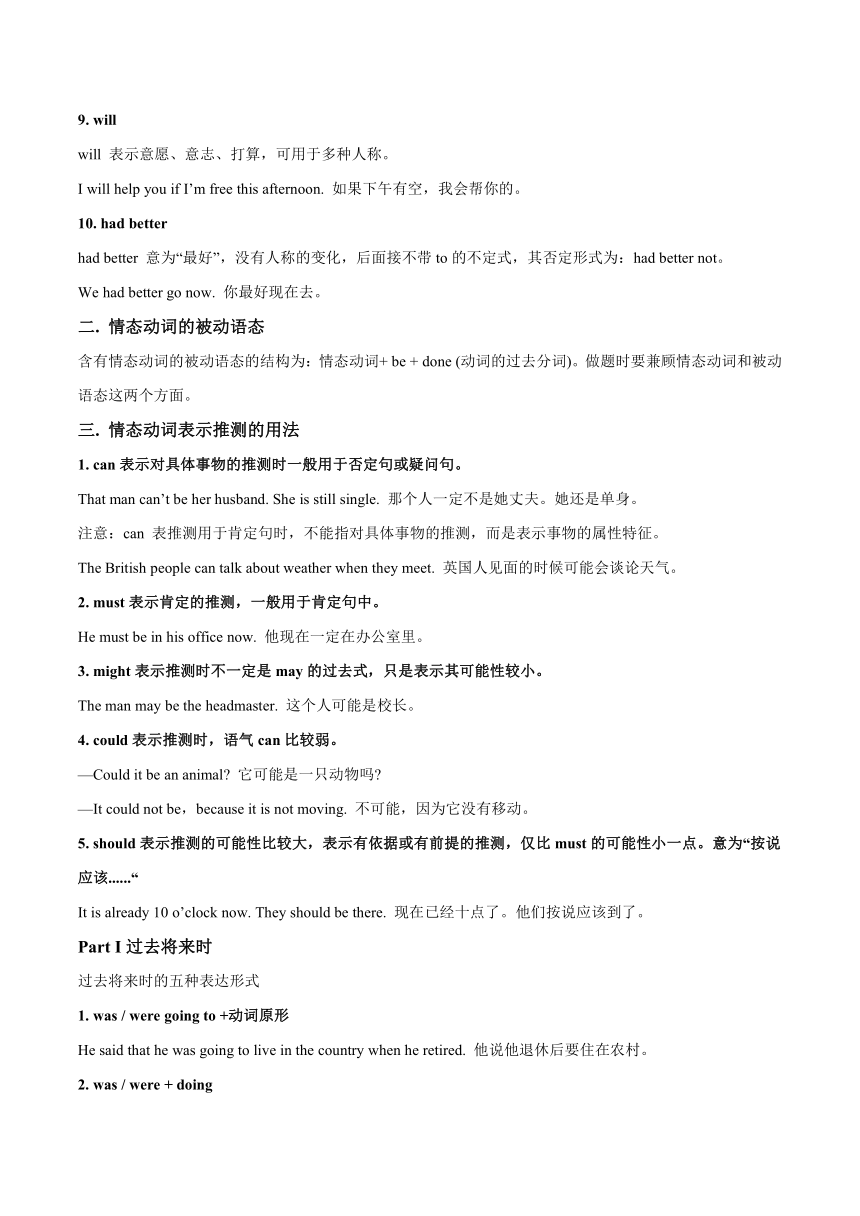人教版(2019)必修 第三册Unit 5 The Value of Money情态动词和过去将来时【期末挑重点】学案(含答案)
文档属性
| 名称 | 人教版(2019)必修 第三册Unit 5 The Value of Money情态动词和过去将来时【期末挑重点】学案(含答案) |

|
|
| 格式 | docx | ||
| 文件大小 | 28.1KB | ||
| 资源类型 | 教案 | ||
| 版本资源 | 人教版(2019) | ||
| 科目 | 英语 | ||
| 更新时间 | 2024-03-01 13:38:55 | ||
图片预览




文档简介
2023-2024学年高一英语下学期期末专项复习(人教版版2019)
专题16 必修三 Unit 5 情态动词和过去将来时
Part I情态动词
情态动词有具体的词义,但也同助动词一样,需要与动词原形一起构成句子的谓语,另外情态动词一般没有人称和数的变化,情态动词后必须跟动词原形。
一、 十个最重要情态动词的用法
1. can
1) 表示能力,一般译为“能、会”,尤其指生来具备的能力。
She can swim fast, but I can’t. 她会游泳,但我不会。
2) 表示许可,常在口语中。
You can use my dictionary. 你可以使用我的词典。
3) 表示推测,意为“可能”,常用于否定句和疑问句中,此时can’t译为“不可能”。
Can the news be true 这个消息可能是真的吗
It can’t be our teacher. He is on a visit to the Great Wall. 不可能是我们老师。他正在参观长城呢。
2. could
1) can的过去式,意为“能、会”,表示过去的能力。
He could write poems when he was 10. 他十岁的时候就会写诗。
2) could在疑问句中,表示委婉请求的语气,此时could没有过去式的意思。
Could you do me a favor 你可以帮我一个忙吗
—Could I use your pen 我可以使用你的钢笔吗
—Yes, you can. (注意回答)可以。
3) could have done, 表示 “本能够做某事”。
I could have been to a better school. 我本来是能够去一个更好的学校的。(实际上并没有)
3. may
1) 表示请求、许可,比can正式。
May I borrow your bike 我可以借用你的自行车吗
You may go home now. 你现在可以回家了。
2) 表示推测,谈论可能性,意为“可能,或许”,一般用于肯定句中。
It may rain tomorrow. 明天可能会下雨。
3) may的过去式为 might, might也可以表示可能性低于may(此时might没有过去式的意思)。
He is away from school. He might be sick. 他离开学校了。也许是病了。
4) 表示希望、祈求、祝愿,常可译为“祝愿”。通常是用may +主+V.
May you have a good time! 祝你玩的愉快!
May you be happy! 祝你快乐!
May you succeed! 祝你成功!
4. must
1) must 表示主观看法,意为“必须”。
You must stay here until I come back. 你必须待在这里,直到我回来。
Must I hand in my homework right now 我现在必须要交作业吗
2) 对must引导的疑问句,肯定回答为must,否定回答为needn’t 或don’t have to。
—Must I finish my homework 我必须完成作业吗
—No, you needn’t. 不,你不必。
3) must也可以表示有把握的推测,意为“ 一定,肯定”,用于肯定句。
The light is on, so he must be at home now. 灯开着,所以他现在一定在家。
4) 其否定形式mustn’t表示“禁止,不许”。
You mustn’t play with fire. 你不许玩火。
You mustn’t be late. 你不许迟到。
注意:其反意问句的构成形式:
当must表示肯定的判断、推测时,其反意疑问句要用实际问句的助动词来构成。
She must have seen the film before, hasn’t she (注意反意疑问句的后半部分)
她之前一定看过这部电影,难道没有吗
You must have met uncle Wang in the shop yesterday, didn’t you (注意反意疑问句的后半部分)
你昨天一定在商店见到王叔叔了,难道没有吗
5. need
1) need表示需要,主要用于否定句和疑问句中,其否定形式为needn’t,意为“不必”。
用need提问时,肯定回答为must,否定回答为needn’t或don’t have to。
—Need I stay here any longer 我需要待在这里吗
—Yes, you must. 是的,你必须。
—No. you needn’t /don’t have to. 不,你不必。
2) need还可以作实义动词,此时有人称、数和时态的变化,如果是人作主语后边多接动词不定式。
I need to do it right now. 我需要现在做这件事。
注意:如果是物作主语,一般用need doing与need to be done,这种情况下应注意两点:
① 主动形式的动名词doing具有被动的含义;
② 该动名词可以改为其动词不定式的被动形式而句子的意义不变。
The door needs painting. = The door needs to be painted. 门需要被油漆。
6. dare
dare意为“敢、敢于”, 用法近似于need,有两种词性:
1) dare作为情态动词,多用于否定句、疑问句或条件句中,无第三人称单数形式,只有一般现在时和一般过去时。
Dare he tell them what he knows 他敢告诉他们他知道的事情吗
I daren’t ask her. Will you do it for me 我不敢问她。你可以为我问吗
2) dare作为实义动词,此时有人称、数及时态的变化。
He doesn’t dare to break his promise. 他不敢违背承诺。
注意:口语中,dare的各种形式常与不带to的不定式连用。
Do you dare tell her what I said 你敢告诉她我说的话吗
7. shall
shall表示征求对方意见(多用于第一、三人称)
Shall we go out for a walk 我们出去散步好吗
Shall the driver wait outside 司机在外面等好吗
8. should
1) should 意为“应该”,可表示劝告、建议、义务、责任等。
We should protect the environment. 我们应该保护环境。
2) 意为“竟然”,表示一种意料之外语气。
I couldn’t believe he should say that. 我简直不敢相信他竟然说出那种话。
3) should have done 意为”本应该做某事而没做“,表示对过去动作的责备、批评。
You should have finished your homework. 你本应该完成作业的。(实际上没有)
9. will
will 表示意愿、意志、打算,可用于多种人称。
I will help you if I’m free this afternoon. 如果下午有空,我会帮你的。
10. had better
had better 意为“最好”,没有人称的变化,后面接不带to的不定式,其否定形式为:had better not。
We had better go now. 你最好现在去。
二. 情态动词的被动语态
含有情态动词的被动语态的结构为:情态动词+ be + done (动词的过去分词)。做题时要兼顾情态动词和被动语态这两个方面。
三. 情态动词表示推测的用法
1. can表示对具体事物的推测时一般用于否定句或疑问句。
That man can’t be her husband. She is still single. 那个人一定不是她丈夫。她还是单身。
注意:can 表推测用于肯定句时,不能指对具体事物的推测,而是表示事物的属性特征。
The British people can talk about weather when they meet. 英国人见面的时候可能会谈论天气。
2. must表示肯定的推测,一般用于肯定句中。
He must be in his office now. 他现在一定在办公室里。
3. might表示推测时不一定是may的过去式,只是表示其可能性较小。
The man may be the headmaster. 这个人可能是校长。
4. could表示推测时,语气can比较弱。
—Could it be an animal 它可能是一只动物吗
—It could not be,because it is not moving. 不可能,因为它没有移动。
5. should表示推测的可能性比较大,表示有依据或有前提的推测,仅比must的可能性小一点。意为“按说应该......“
It is already 10 o’clock now. They should be there. 现在已经十点了。他们按说应该到了。
Part I过去将来时
过去将来时的五种表达形式
1. was / were going to +动词原形
He said that he was going to live in the country when he retired. 他说他退休后要住在农村。
2. was / were + doing
Nobody knew whether the guests were coming. 没人知道客人们是否要来。
3. was / were + to do
It was reported that another bridge was to be built across the Yangtse River. 据报道长江上将要再建一座大桥。
注意: “was / were going to + 动词原形” 或 “was / were + 动词不定式完成式” 可表示未能实现的过去将来时间的动作。
Last Sunday we were going to visit the Great Wall, but it rained. 上星期天我们本想去游览长城的,但却下雨了。(没有去成)
I was to have helped with the performance, but I got flu the day before. 我是打算帮忙演出的,但前天我感冒了。(没有帮上忙)
4. was / were about to do, 表示说话的瞬间就会发生的动作。
I felt something terrible was about to happen. 我觉得有可怕的事要发生了。
5. was / were on the point of doing
I’m glad you have come. I was on the point of calling you, but you’ve saved me the trouble now.
很高兴你来了。我正准备给你打电话,现在你省去我这个麻烦了。
提示: “be about to do” 和 “be on the point of doing” 结构一般不与表示将来的时间状语连用,但后面可以接 when 引导的分句。
I was about to start when it suddenly began to rain. 我正要动身天突然下雨了。
即学即练
Part I 单项选择
1. I thought you ________ like something to read, so I have brought you some books.
A. may B. might C. could D. must
2.You ________ to the meeting this afternoon if you have something important to do.
A. needn’t to come B. don’t need come C. don’t need coming D. needn’t come
3. He ________ you more help, even though he was very busy.
A. might have given B. might give C. may have given D. may give
4. —________ I help you with some shoes, madam
— Yes, I would like to try on those brown ones.
A. Will B. Should C. May D. Must
5. The reason why they ________ leave wasn’t explained to us.
A. had B. had to C. must D. might
6. I searched for my wallet and it wasn’t there. I thought I ________ it at home.
A. left B. have left C. might have left D. could have left
7. I ________ asleep because it took me a long time to realize that the telephone was ringing.
A. could have fallen B. should have fallen C. must have fallen D. mustn’t have fallen
8. The only thing that really matters to the children is how soon they ________ return to their school.
A. can B. must C. have to D. ought to
9. I want to go to the chemist’s, but you ________ go with me.
A. need not B. must not C. need D. must
10. I thought it over, but ________ come to no conclusion.
A. can B. could C. should D. would
11. What we ________ get seems better than what we have.
A. can B. could C. can’t D. couldn’t
12. — My goodness! I’ve just missed the train.
— That’s too bad. I am sure you ________ it, if you had hurried.
A. could have caught B. had caught C. would catch D. could catch
13. Look! What you’ve done! You ________ more careful.
A. may be B. had to C. should have been D. would be
14. ________ I repeat the question
A. Shall B. Will C. Do you want that D. Do
15. Professor Li, many students want to see you. ________ they wait here or outside!
A. Do B. Will C. Shall D. Are
16. You ________ read that book if you don’t want to.
A. haven’t B. can’t C. mustn’t D. needn’t
17. Johnny, you ________ play with the knife; you ________ hurt yourself
A. won’t; can’t B. can’t; shouldn’t C. shouldn’t; must D. mustn’t; may
18. It’s nearly seven o’clock. Jack ________ be here at any moment.
A. must B. need C. can D. should
19. — There were already 5 people in the car, but they managed to take me as well.
— It ________ a comfortable journey.
A. can’t be B. shouldn’t be C. couldn’t have been D. mustn’t have been
20. Tom ought not to ________ me your secret, but he meant no harm.
A. have told B. tell C. be telling D. having told
21. Everyone is here. ________ we start the meeting
A. Can B. Must C. Should D. Shall
22. I parked my car right here but now it’s gone. It ________.
A. must be stolen B. may be stolen C. must have stolen D. must have been stolen
23. He ________ the work yesterday, but he didn’t.
A. must have finished B. need have finished C. finished D. should have finished
24. He did not pass the examination. As a good student, he ________.
A. mustn’t have failed B. may not have failed C. needn’t have failed D. shouldn’t have failed
25. ________ it be true that Albert passed the test in geography
A. May B. should C. Could D. would
26. You ________ lead a horse to the water but you ________ not make it drink.
A. will; can B. may; can C. may; dare D. dare; can
27. — Must we finish the composition in class
— No, you ________.
A. needn’t B. mustn’t C. won’t D. shouldn’t
28. Her eyes were red. She ________.
A. must cry B. must be cried C. must have been crying D. may cry
29. Mary ________ his letter, otherwise she would have replied before now.
A. has received B. must receive C. couldn’t have received D. shouldn’t have received
30. I told Sally how to get here, but perhaps I ________ for her.
A. had to write it out B. must have written it out
C. should have written it out D. ought to write it out
Part II 单句语法填空
1. Miss Zhang said she ________(visit) the Great Wall next summer.
2. She told him that she ________(not stay) here for long.
3. I wasn’t sure whether Lucy_______(come) the next year.
4. The scientists said the world’s population _______ (slow) down in future.
5. She said the bus _______(leave) at five the next morning.
6. I wasn’t sure whether he _______(lend) me his book the next morning.
7. He was fifty-six. In two years he _______(be) fifty-eight.
8. Whenever she has time, she ______(help) them in their work.
Part III 翻译句子
1. 她一定把钥匙丢了。
2. 他们一定走了,可是应当给我留一个条子呀!
3. 你本不必要把整个课文都译成汉语。
4. 我是可能早一些来的, 可是我在路上碰到一个朋友。
5. 下一次你应该更小心些。
即学即练参考答案
Part I 单项选择
1.B 2.D 3.A 4. C 5. B 6. C 7. C 8. A 9. A 10. B
11.C 12.A 13.C 14.A 15.C 16.D 17.D 18.D 19.C 20.A
21.D 22.D 23.D 24.D 25. C 26.B 27.A 28.C 29.C 30.C
Part II 单句语法填空
1. would visit 2. would not stay 3. would come 4. would slow 5. was leaving
6. would lend 7. would be 8. would help
Part III 翻译句子
1. She must have lost her key.
2. The must have left, but they should have left us a note.
3. You needn't have translated the whole text into Chinese.
4. I could have arrived a little earlier, but I met a friend of mine on the way.
5. You should be more careful next time.
专题16 必修三 Unit 5 情态动词和过去将来时
Part I情态动词
情态动词有具体的词义,但也同助动词一样,需要与动词原形一起构成句子的谓语,另外情态动词一般没有人称和数的变化,情态动词后必须跟动词原形。
一、 十个最重要情态动词的用法
1. can
1) 表示能力,一般译为“能、会”,尤其指生来具备的能力。
She can swim fast, but I can’t. 她会游泳,但我不会。
2) 表示许可,常在口语中。
You can use my dictionary. 你可以使用我的词典。
3) 表示推测,意为“可能”,常用于否定句和疑问句中,此时can’t译为“不可能”。
Can the news be true 这个消息可能是真的吗
It can’t be our teacher. He is on a visit to the Great Wall. 不可能是我们老师。他正在参观长城呢。
2. could
1) can的过去式,意为“能、会”,表示过去的能力。
He could write poems when he was 10. 他十岁的时候就会写诗。
2) could在疑问句中,表示委婉请求的语气,此时could没有过去式的意思。
Could you do me a favor 你可以帮我一个忙吗
—Could I use your pen 我可以使用你的钢笔吗
—Yes, you can. (注意回答)可以。
3) could have done, 表示 “本能够做某事”。
I could have been to a better school. 我本来是能够去一个更好的学校的。(实际上并没有)
3. may
1) 表示请求、许可,比can正式。
May I borrow your bike 我可以借用你的自行车吗
You may go home now. 你现在可以回家了。
2) 表示推测,谈论可能性,意为“可能,或许”,一般用于肯定句中。
It may rain tomorrow. 明天可能会下雨。
3) may的过去式为 might, might也可以表示可能性低于may(此时might没有过去式的意思)。
He is away from school. He might be sick. 他离开学校了。也许是病了。
4) 表示希望、祈求、祝愿,常可译为“祝愿”。通常是用may +主+V.
May you have a good time! 祝你玩的愉快!
May you be happy! 祝你快乐!
May you succeed! 祝你成功!
4. must
1) must 表示主观看法,意为“必须”。
You must stay here until I come back. 你必须待在这里,直到我回来。
Must I hand in my homework right now 我现在必须要交作业吗
2) 对must引导的疑问句,肯定回答为must,否定回答为needn’t 或don’t have to。
—Must I finish my homework 我必须完成作业吗
—No, you needn’t. 不,你不必。
3) must也可以表示有把握的推测,意为“ 一定,肯定”,用于肯定句。
The light is on, so he must be at home now. 灯开着,所以他现在一定在家。
4) 其否定形式mustn’t表示“禁止,不许”。
You mustn’t play with fire. 你不许玩火。
You mustn’t be late. 你不许迟到。
注意:其反意问句的构成形式:
当must表示肯定的判断、推测时,其反意疑问句要用实际问句的助动词来构成。
She must have seen the film before, hasn’t she (注意反意疑问句的后半部分)
她之前一定看过这部电影,难道没有吗
You must have met uncle Wang in the shop yesterday, didn’t you (注意反意疑问句的后半部分)
你昨天一定在商店见到王叔叔了,难道没有吗
5. need
1) need表示需要,主要用于否定句和疑问句中,其否定形式为needn’t,意为“不必”。
用need提问时,肯定回答为must,否定回答为needn’t或don’t have to。
—Need I stay here any longer 我需要待在这里吗
—Yes, you must. 是的,你必须。
—No. you needn’t /don’t have to. 不,你不必。
2) need还可以作实义动词,此时有人称、数和时态的变化,如果是人作主语后边多接动词不定式。
I need to do it right now. 我需要现在做这件事。
注意:如果是物作主语,一般用need doing与need to be done,这种情况下应注意两点:
① 主动形式的动名词doing具有被动的含义;
② 该动名词可以改为其动词不定式的被动形式而句子的意义不变。
The door needs painting. = The door needs to be painted. 门需要被油漆。
6. dare
dare意为“敢、敢于”, 用法近似于need,有两种词性:
1) dare作为情态动词,多用于否定句、疑问句或条件句中,无第三人称单数形式,只有一般现在时和一般过去时。
Dare he tell them what he knows 他敢告诉他们他知道的事情吗
I daren’t ask her. Will you do it for me 我不敢问她。你可以为我问吗
2) dare作为实义动词,此时有人称、数及时态的变化。
He doesn’t dare to break his promise. 他不敢违背承诺。
注意:口语中,dare的各种形式常与不带to的不定式连用。
Do you dare tell her what I said 你敢告诉她我说的话吗
7. shall
shall表示征求对方意见(多用于第一、三人称)
Shall we go out for a walk 我们出去散步好吗
Shall the driver wait outside 司机在外面等好吗
8. should
1) should 意为“应该”,可表示劝告、建议、义务、责任等。
We should protect the environment. 我们应该保护环境。
2) 意为“竟然”,表示一种意料之外语气。
I couldn’t believe he should say that. 我简直不敢相信他竟然说出那种话。
3) should have done 意为”本应该做某事而没做“,表示对过去动作的责备、批评。
You should have finished your homework. 你本应该完成作业的。(实际上没有)
9. will
will 表示意愿、意志、打算,可用于多种人称。
I will help you if I’m free this afternoon. 如果下午有空,我会帮你的。
10. had better
had better 意为“最好”,没有人称的变化,后面接不带to的不定式,其否定形式为:had better not。
We had better go now. 你最好现在去。
二. 情态动词的被动语态
含有情态动词的被动语态的结构为:情态动词+ be + done (动词的过去分词)。做题时要兼顾情态动词和被动语态这两个方面。
三. 情态动词表示推测的用法
1. can表示对具体事物的推测时一般用于否定句或疑问句。
That man can’t be her husband. She is still single. 那个人一定不是她丈夫。她还是单身。
注意:can 表推测用于肯定句时,不能指对具体事物的推测,而是表示事物的属性特征。
The British people can talk about weather when they meet. 英国人见面的时候可能会谈论天气。
2. must表示肯定的推测,一般用于肯定句中。
He must be in his office now. 他现在一定在办公室里。
3. might表示推测时不一定是may的过去式,只是表示其可能性较小。
The man may be the headmaster. 这个人可能是校长。
4. could表示推测时,语气can比较弱。
—Could it be an animal 它可能是一只动物吗
—It could not be,because it is not moving. 不可能,因为它没有移动。
5. should表示推测的可能性比较大,表示有依据或有前提的推测,仅比must的可能性小一点。意为“按说应该......“
It is already 10 o’clock now. They should be there. 现在已经十点了。他们按说应该到了。
Part I过去将来时
过去将来时的五种表达形式
1. was / were going to +动词原形
He said that he was going to live in the country when he retired. 他说他退休后要住在农村。
2. was / were + doing
Nobody knew whether the guests were coming. 没人知道客人们是否要来。
3. was / were + to do
It was reported that another bridge was to be built across the Yangtse River. 据报道长江上将要再建一座大桥。
注意: “was / were going to + 动词原形” 或 “was / were + 动词不定式完成式” 可表示未能实现的过去将来时间的动作。
Last Sunday we were going to visit the Great Wall, but it rained. 上星期天我们本想去游览长城的,但却下雨了。(没有去成)
I was to have helped with the performance, but I got flu the day before. 我是打算帮忙演出的,但前天我感冒了。(没有帮上忙)
4. was / were about to do, 表示说话的瞬间就会发生的动作。
I felt something terrible was about to happen. 我觉得有可怕的事要发生了。
5. was / were on the point of doing
I’m glad you have come. I was on the point of calling you, but you’ve saved me the trouble now.
很高兴你来了。我正准备给你打电话,现在你省去我这个麻烦了。
提示: “be about to do” 和 “be on the point of doing” 结构一般不与表示将来的时间状语连用,但后面可以接 when 引导的分句。
I was about to start when it suddenly began to rain. 我正要动身天突然下雨了。
即学即练
Part I 单项选择
1. I thought you ________ like something to read, so I have brought you some books.
A. may B. might C. could D. must
2.You ________ to the meeting this afternoon if you have something important to do.
A. needn’t to come B. don’t need come C. don’t need coming D. needn’t come
3. He ________ you more help, even though he was very busy.
A. might have given B. might give C. may have given D. may give
4. —________ I help you with some shoes, madam
— Yes, I would like to try on those brown ones.
A. Will B. Should C. May D. Must
5. The reason why they ________ leave wasn’t explained to us.
A. had B. had to C. must D. might
6. I searched for my wallet and it wasn’t there. I thought I ________ it at home.
A. left B. have left C. might have left D. could have left
7. I ________ asleep because it took me a long time to realize that the telephone was ringing.
A. could have fallen B. should have fallen C. must have fallen D. mustn’t have fallen
8. The only thing that really matters to the children is how soon they ________ return to their school.
A. can B. must C. have to D. ought to
9. I want to go to the chemist’s, but you ________ go with me.
A. need not B. must not C. need D. must
10. I thought it over, but ________ come to no conclusion.
A. can B. could C. should D. would
11. What we ________ get seems better than what we have.
A. can B. could C. can’t D. couldn’t
12. — My goodness! I’ve just missed the train.
— That’s too bad. I am sure you ________ it, if you had hurried.
A. could have caught B. had caught C. would catch D. could catch
13. Look! What you’ve done! You ________ more careful.
A. may be B. had to C. should have been D. would be
14. ________ I repeat the question
A. Shall B. Will C. Do you want that D. Do
15. Professor Li, many students want to see you. ________ they wait here or outside!
A. Do B. Will C. Shall D. Are
16. You ________ read that book if you don’t want to.
A. haven’t B. can’t C. mustn’t D. needn’t
17. Johnny, you ________ play with the knife; you ________ hurt yourself
A. won’t; can’t B. can’t; shouldn’t C. shouldn’t; must D. mustn’t; may
18. It’s nearly seven o’clock. Jack ________ be here at any moment.
A. must B. need C. can D. should
19. — There were already 5 people in the car, but they managed to take me as well.
— It ________ a comfortable journey.
A. can’t be B. shouldn’t be C. couldn’t have been D. mustn’t have been
20. Tom ought not to ________ me your secret, but he meant no harm.
A. have told B. tell C. be telling D. having told
21. Everyone is here. ________ we start the meeting
A. Can B. Must C. Should D. Shall
22. I parked my car right here but now it’s gone. It ________.
A. must be stolen B. may be stolen C. must have stolen D. must have been stolen
23. He ________ the work yesterday, but he didn’t.
A. must have finished B. need have finished C. finished D. should have finished
24. He did not pass the examination. As a good student, he ________.
A. mustn’t have failed B. may not have failed C. needn’t have failed D. shouldn’t have failed
25. ________ it be true that Albert passed the test in geography
A. May B. should C. Could D. would
26. You ________ lead a horse to the water but you ________ not make it drink.
A. will; can B. may; can C. may; dare D. dare; can
27. — Must we finish the composition in class
— No, you ________.
A. needn’t B. mustn’t C. won’t D. shouldn’t
28. Her eyes were red. She ________.
A. must cry B. must be cried C. must have been crying D. may cry
29. Mary ________ his letter, otherwise she would have replied before now.
A. has received B. must receive C. couldn’t have received D. shouldn’t have received
30. I told Sally how to get here, but perhaps I ________ for her.
A. had to write it out B. must have written it out
C. should have written it out D. ought to write it out
Part II 单句语法填空
1. Miss Zhang said she ________(visit) the Great Wall next summer.
2. She told him that she ________(not stay) here for long.
3. I wasn’t sure whether Lucy_______(come) the next year.
4. The scientists said the world’s population _______ (slow) down in future.
5. She said the bus _______(leave) at five the next morning.
6. I wasn’t sure whether he _______(lend) me his book the next morning.
7. He was fifty-six. In two years he _______(be) fifty-eight.
8. Whenever she has time, she ______(help) them in their work.
Part III 翻译句子
1. 她一定把钥匙丢了。
2. 他们一定走了,可是应当给我留一个条子呀!
3. 你本不必要把整个课文都译成汉语。
4. 我是可能早一些来的, 可是我在路上碰到一个朋友。
5. 下一次你应该更小心些。
即学即练参考答案
Part I 单项选择
1.B 2.D 3.A 4. C 5. B 6. C 7. C 8. A 9. A 10. B
11.C 12.A 13.C 14.A 15.C 16.D 17.D 18.D 19.C 20.A
21.D 22.D 23.D 24.D 25. C 26.B 27.A 28.C 29.C 30.C
Part II 单句语法填空
1. would visit 2. would not stay 3. would come 4. would slow 5. was leaving
6. would lend 7. would be 8. would help
Part III 翻译句子
1. She must have lost her key.
2. The must have left, but they should have left us a note.
3. You needn't have translated the whole text into Chinese.
4. I could have arrived a little earlier, but I met a friend of mine on the way.
5. You should be more careful next time.
